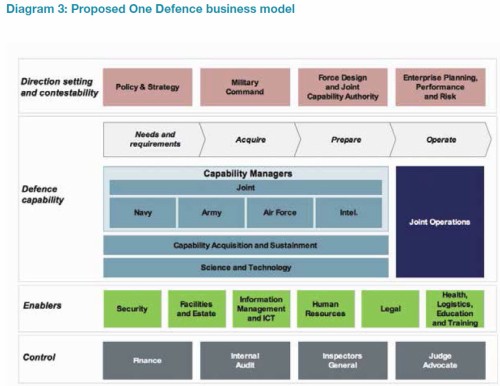The report of the First Principles Review Team into the workings of the Australian Defence Department and the Defence Materiel Organisation (DMO) will be a hot topic of discussion at the upcoming Project Governance and Controls Symposium (PGCS) in Canberra next month.
The report found that a holistic, fully integrated One Defence system is essential if Defence is to deliver on its mission in the most effective and efficient way. The major consequence of the reports recommendation to ‘Establish a single end-to-end capability development function within the Department to maximise the efficient, effective and professional delivery of military capability’; is the decision to disband DMO and integrate procurement back into the main functions of the Department. All but one of the reports 70 recommendations have been accepted by Government [Download the report].
Three aspects of the report closely align with the objectives of the PGCS.
First, at the macro level, the report recommends ‘Ensure committed people with the right skills are in appropriate jobs to create the One Defence workforce’ one of the key objectives of PGCS is to bring knew knowledge and research to the governance and controls community.
Second, the need for effective controls systems was simply seen as a ‘given’.
finally, at a more specific level, many of the report findings suggest there is a singular lack of effective governance and controls within the DMO procurement processes. Effective governance and controls is not measured by the quantity of processes, procedures and committees, but by the effectiveness of the project and programs being governed and controlled in meeting their objectives.
The reported need for acquisition teams to comply with over 10,000 Defence Materiel Organisation specific policies and procedures which include 35 policy and procedure artefacts totalling around 12,500 pages on procurement processes and controls is appallingly bad governance. The consequence of this paper mountain is that the average government submission is 70 pages long, takes 16 weeks to move through the Cabinet preparation process and an average of 46 months to progress from first pass initiation through to second pass approval. The result is slow delivery, high cost and inefficient procurement.
Add to this around 200 active committees in the organisation and lack of clear responsibility and reporting lines completes the picture of an organisation that has spent decades adding more processes, procedures, committees and check points to ‘all future projects’ every time an issue occurred in one project – one size does not ‘fit all’ and adding process never prevents the occurrence of other issues.
The proposed business model will go a long way to eliminating many of these unnecessary checks and reviews.
The essence of good governance is to have the right balance of checks and reviews supported by reliable information from an effective controls system, customised to meet the needs of different sizes and types of project and program. This statement has a number of key components:
- Project controls includes: the data gathering, management and analytical processes used to predict, understand and constructively influence the time and cost outcomes of a project or program; through the communication of information in formats that assist effective management and decision making. See: /2013/11/21/project-controls-a-definition-2/
- Reliable information requires effective through life surveillance – preferably independent of the projects and programs being monitored, see: http://www.mosaicprojects.com.au/WhitePapers/WP1080_Project_Reviews.pdf
- Reliable information also requires a clear understanding or the inevitable risk and variability inherent in every forward estimate – there is no such thing as a certain estimate.
- The governance system and the organisation’s ‘governors’ need to actively support this controls infrastructure and protect it from the inevitable attacks.
- The governance and management systems also need people in place that understand the management information being provided by the controls systems. For more on governance of PPP see: http://www.mosaicprojects.com.au/PM-Knowledge_Index.html#OrgGov1
The objective of the PGCS is to develop the linkage between governance and controls. Many of these capabilities have been developed within the UK government including its ‘Major Projects Authority’ and the successful approach used to develop Cross Rail, the London Olympics and two new mega projects, Thames Tideway and the HS2 railway from London to the ‘North’. We can learn a lot from the UK experience.
One of the PGCS keynote speakers is Steve Wake, Chairman of the Board of the Association for Project Management (APM) in the United Kingdom. His presentation is focused on the status of project management and project governance and controls from an international and British perspective.
If you want to join us and be part of the discussion now is a good time to book your place at the PGCS, full details are on the website at: http://www.pgcs.org.au/
I will be posting more on the lessons from the One Defence later.


